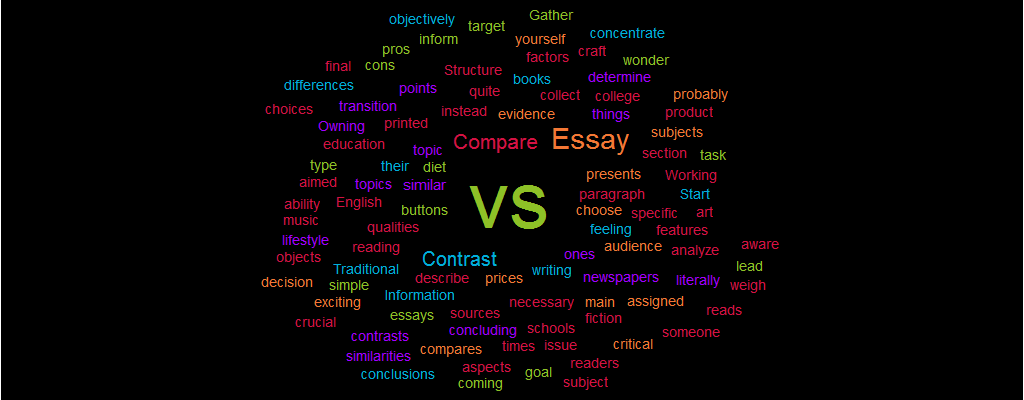Writing a Compare and Contrast Essay Quickly and Easily
Publication Date:

During your college life, you will be assigned to write compare and contrast essays for many times. This type of writing is aimed to show your ability to analyze two specific subjects, like art, music, any product, diet, lifestyle, literally any kind of issue, and determine their similar and different qualities. This is quite a simple and exciting task, so you probably will not wonder, “Who will do my essay for me,” and instead craft it yourself.
What is a Compare and Contrast Essay
Such an essay compares similar objects or contrasts different ones with a target to inform the audience about both pros and cons. You can choose to write your essay about both differences and similarities or concentrate just on different or similar aspects.
One more goal of such a paper is to help the readers make critical choices. When someone reads your essay, they can weigh all the factors that you write about before coming up with their own conclusions that will lead them to a final decision. After reading your paper, your audience has to become more aware of the subject you describe.
Where to Gather Information
To be able to compare things objectively, it is crucial to operate facts. Meaning, you must collect corresponding evidence. Look for both the primary and secondary sources on the topic. Ensure they are reliable and up-to-date (no older than five years). You can use both printed and web-based resources to collect the necessary information, but make sure they are trustworthy. Among credible scholarly sources are books, textbooks, newspapers, official reports, documentaries, academic journals, scientific magazines, and so on.
How to Structure an Essay
Jot down the main points and the evidence. Choose the organizational structure to apply in your paper. Do not try to combine several structures in one paper. There are two most common approaches to use when constructing your essay:
- Arranging point-by-point, when you describe similar features and then move to the different ones;
- Writing about one item, and then switching to the next one.
In the introductory paragraph, explain the ideas that you will compare and contrast further. Start with the catchy hook to force your audience to keep reading. This section has to be finished with a thesis statement that presents your main argument.
Move to the body section, divided into several (usually, three) paragraphs. Each of them has to be devoted to a specific point. Start every paragraph with a topic sentence. Include substantial evidence to support your claims and provide a thorough analysis of the topic. Do not try to write about too many points at once; instead, choose only the most important or interesting ones. End each paragraph with a concluding sentence and a transition to the next point. Transition words and phrases improve the flow of the writing by indicating that you are going to switch to the next idea.
In the concluding paragraph, sum up all the similar and different qualities that you presented in an essay. Make sure that the last sentence provides the feeling of completeness.
How to Choose a Topic
Every essay writer knows that it is necessary to avoid too broad and too narrow topics. It is always preferable to select something that you know well or at least are interested in. Look for two things that have enough similar and different features. We have come up with a list of topics that can inspire you.
- Working at home vs working in the office
- Public schools vs private schools
- Harry Potter vs Lord of the Rings
- Painting vs photography
- Feeling lonely vs feeling exhausted
- Living in the city vs living in the village
- Outdoor activities vs video games
- Fruits vs vegetables
- Seasonal relationships vs being alone
- Being the only one child vs having siblings
- Television vs newspapers
- Owning cats vs owning dogs
- Audiobooks vs printed books
- American English vs British English
- Traditional education vs online education
- Samsung vs Apple
- Extroverts vs introverts
- Being wealthy vs living in poverty
- Tea vs coffee
- Camping in the mountains vs beach vacation
- Day time vs night time
- Fantastic fiction vs non-fiction literature
- Comics vs manga
- Psychology vs sociology
- Gold vs silver
- Coke vs Pepsi
- Startups vs huge corporations
- McDonald’s vs KFC
- Summertime vs wintertime
- Giving presents vs receiving presents
- Texting vs talking
- Traditional photos vs selfies
- Dating vs marriage
- Yoga vs Pilates
- Laptops vs tablets